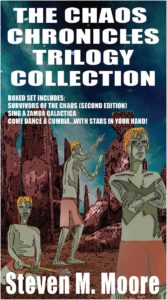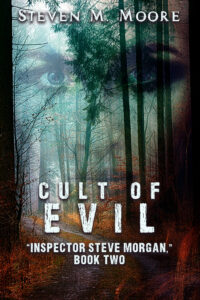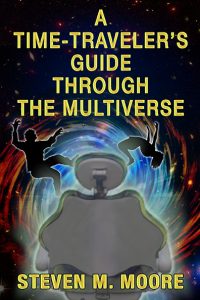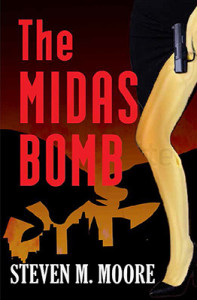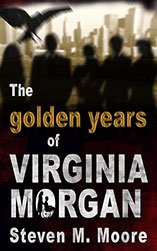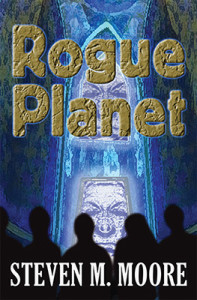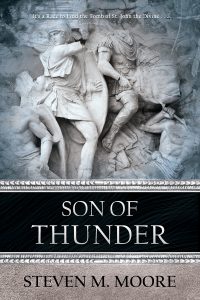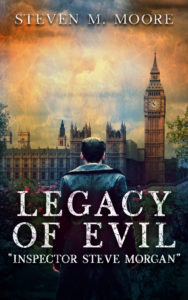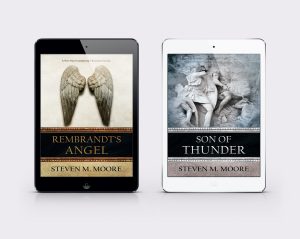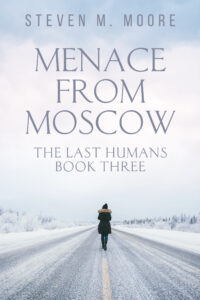[Note from Steve: I’ve been remiss in offering these short stories and novellas. If anyone cares, I’ve been doing what the title says. (I hope…although, some who also read my political blog might argue that my retirement from running novelistic marathons is far from graceful!) In any case, I thought it was appropriate to end this series by returning to my intrepid Detective Rolando Castilblanco, one of my earliest creations. I hope you enjoy the story!]
***
Aging Gracefully
Copyright 2024, Steven M. Moore
Pam put down her section of the Times, removed her reading glasses, and smiled at me. I put down my glass of Jameson—I only did a few sips now, still neat—and smiled back. Drinking that brew never had been an homage to the stereotypical Irish cops in the NYPD. I just preferred it over other whiskeys—bourbon too biting, scotch too smoky—and whiskey over rum and coke or some other drink people often consider more typical of Puerto Ricans. Maybe I had acquired enough blarney to make my choice even more logical?
I knew this woman so well now that which smile she was flashing me was obvious: She was going to propose something that I might not be keen on doing but would willingly do if I could because she’s the love of my life. There might even be an argument that I knew I’d probably lose, again willingly. After all, the man is the king of his castle until the queen arrives, as they say. That’s a rule for any man to live by when it came to his woman! And in my case, I figured I was lucky to have her.
Let’s face it: I’ve always looked like many of the thugs I’ve often pursued and arrested, and that never changed for the better as I aged. I’m a bear of a man, always have been, from the time when I was still a young and nimble Navy SEAL traipsing around in the Middle East to when I walked out the precinct’s doors to become ex-Sergeant Rolando Castilblanco, celebratory emphasis on “ex.”
None of my detective skills involved mind-reading, though, so I waited to hear what mi mariposa’s sly smile meant, secure in the knowledge that whatever it meant might get me into trouble. That had happened, sometimes getting Pam into trouble as well.
“You know, Rollie, our European trip wasn’t exactly the romantic vacation I’d imagined.”
Talk about stating the obvious! Assuming her comment was about how the terrorist Kadar had resurrected from the dead to begin his evil campaign by nearly killing me, a very good assumption albeit a bit dated, Pam’s observation was an understatement. Or was she referring to our more recent little getaway when we visited Esther and Bastiann in London? That had begun back in New York with an attack on our daughter, Ceci. I ended up working in London to thwart some Chinese agents, so that trip wasn’t exactly pleasureful either.
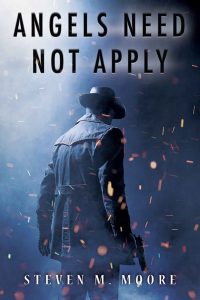 It was unusual and interesting how my “Big Apple beat” prowling for criminal lowlifes on the city’s mean streets so often took me elsewhere in the US and abroad. Pursuing the murderer of an FBI agent’s son—the agent had been a good friend and became a love interest for my partner Chen—that pursuit had taken me to the Fascist Republic of Texas and had ended in a trip to the Caribbean. (The state had become much worse over the years, a place smart Latinos and women needing abortions had to avoid now because their lives depended on it!) Unlike AOC and all her little commies, I’d seen Cuba wasn’t the worker’s paradise, but maybe I was just biased after being shot at in Gitmo.
It was unusual and interesting how my “Big Apple beat” prowling for criminal lowlifes on the city’s mean streets so often took me elsewhere in the US and abroad. Pursuing the murderer of an FBI agent’s son—the agent had been a good friend and became a love interest for my partner Chen—that pursuit had taken me to the Fascist Republic of Texas and had ended in a trip to the Caribbean. (The state had become much worse over the years, a place smart Latinos and women needing abortions had to avoid now because their lives depended on it!) Unlike AOC and all her little commies, I’d seen Cuba wasn’t the worker’s paradise, but maybe I was just biased after being shot at in Gitmo.
“Don’t keep me in suspense, mi amor,” I said to my wife. “What are you proposing?”
***
Pam thought a moment. She’d been a TV personality but was without a script writer, so maybe she was looking for the right words to convince me? I knew she would eventually, but I hoped it wasn’t a long, drawn-out discussion.
 “I was referring to our trip when that awful terrorist was kidnapping those aristocrats,” she finally said.
“I was referring to our trip when that awful terrorist was kidnapping those aristocrats,” she finally said.
I nodded: That had been my first guess. Kadar had made both our lives and Chen’s miserable. Where was this going?
“We could avoid any possibility for a repetition of something like that by taking a river cruise like Esther and Bastiann did for their honeymoon.”
“Please remember that Bastiann had to solve a murder case on that riverboat,” I said. “That wasn’t exactly a joyful and romantic honeymoon for those two old lovebirds.”
“Oh, that could never occur again. You’re not a cop any longer; I’m not a reporter. Very few people even know we exist anymore. Our kids now live more dangerous lives that we do.”
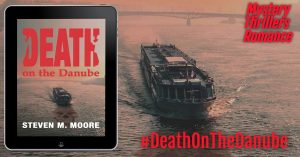 I wasn’t going to argue with her about that—Ceci was a CSI and Pedro was a cop, and both had already proven their livelihoods could lead them into danger—but as an ex-cop, I still had many enemies, including some lowlifes still in jail who might have it in for me and would soon get out for “good behavior.” Even dumb apes with one-track minds can hold a grudge for years!
I wasn’t going to argue with her about that—Ceci was a CSI and Pedro was a cop, and both had already proven their livelihoods could lead them into danger—but as an ex-cop, I still had many enemies, including some lowlifes still in jail who might have it in for me and would soon get out for “good behavior.” Even dumb apes with one-track minds can hold a grudge for years!
“I suppose you have a tour already picked out?”
“I do. The same tour in fact with the same riverboat company Esther and Bastiann used.” She smiled. This was now one of her gotcha-smiles. “Less chance of a repeat if I understand Bayesian statistics at all.”
Bayesian statistics? Is that a thing? What the hell has she been reading? Pam had always been more curious and self-taught than I am. Her work had covered lots of topics with interviews of many so-called experts on many things. The perps I’d caught were generally the dumb ones. The smart perps, often psychotic sociopaths, used their better brains to commit evil deeds, an exception being a certain ex-president who wasn’t smart at all and just barely escaped serious jail time…and maybe a firing squad for being a traitor?
“Are we doing Munich or Prague before the riverboat cruise?” I knew something about Esther and Bastiann’s trip, more his version than hers.
“No. This will be a trial run for you. It should be easy. They have one-, two-, or three-level difficulty ratings for their land tours, or we can just stay onboard and watch the Danube flow by.”
Oh joy, I thought, recalling that all those new fascist European countries we’d also be passing by.
***
Our European super-vacation was delayed!
I knew something was wrong as we sat at our gate at JFK and I heard shots fired. Later I learned that the small group of terrorists had broken through TSA security, killing three poor agents on their way to our gate.
When they arrived, I saw they were dressed in business suits. (I suppose full military regalia might have been suspicious.) They were waving pistols with huge magazines hanging from their undersides; I guessed they had more mags in their pockets. TSAs’ scanners would have spotted those weapons obviously, so that must be why they’d broken through the security station. An obvious point of failure! Maybe TSA needed to screen people as they entered the terminal instead?
Domestic terrorism had plagued the US even before that ex-president had tried to overthrow the US government claiming fraud in that election where he’d been the big loser. Militia members from California had participated in a crazy cartel leader’s plan to take over most of the American drug trade that oxycontin manufacturers had shown to be so profitable. Al Qaeda terrorists had participated as well. It had been a huge cluster-fuck that had almost killed Hal, an American Interpol colleague of the Dutch Bastiann; they’d become consultants for MI5. I knew all this for multiple reasons, the last because of submarines. Long story!
Our terrorists didn’t wear red hats, big sombreros, or military helmets, some apparel that might have made security agents wonder. They looked more like young businessmen off to have a good time at a boondoggling meeting somewhere in Europe. I bided my time, thinking about one, what they intended to accomplish, and two, what I could do to help prevent it. It was clear that the terminal would soon be invaded by US agents of all types. In a firefight, innocent people could die. Shit, Pam and I could die! Not exactly the vacation she’d wanted!
Sometimes on a case, Chen or I discussed a perp’s possible motives. Knowing them could help us solve the case. The weird cases were those we solved without ever learning the motives. In Europe, the case of that terrorist Kadar had almost been like that. He’d had a whole lot of so-called “counterterrorism experts” baffled. There’d been a clear motive, a terrible one, to be honest, so we’d been lucky to stop him.
Consequently, I couldn’t help wondering what these domestic terrorists’ motives were. With all the airport’s security around and more on call who’d be there in minutes, why take the risk of mounting what could very well be a suicide op for them?
Suicide? My memories time-traveled back to 9/11/2001! Our plane wasn’t a good one to hijack to Cuba or anywhere else. It was a huge jumbo with a lot of twelve-seat rows in a 3-6-3 combo separated by two aisles. I used my smart phone to find out where it was headed after Frankfort, Germany, hoping that would provide a clue. The answer I got was Tel Aviv, Israel.
Despite that crazy ex-president’s efforts—he’d encouraged the Israelis to make Jerusalem their new capital, pissing off a lot of Muslims and even Christians who shared that holy city as a shrine—Tel Aviv was still the most important city in Israel for multiple reasons, mostly economic. It was a safe assumption that the SOBs at JFK wanted to go there, although the plane would have enough fuel to go to other places. And big cities don’t only exist in America! London or Paris could also be a target. (The jumbo would need a large airport to land, if a landing was in the terrorists’ plan.)
As the terrorists tried to maintain control of a lot of frightened passengers, I studied them. They were black-haired, brown-eyed, and swarthy-skinned, but hell, that describes me as well! They could be from anywhere and fanatics about anything.
I moved closer to a subgroup of them to try to determine their language. A gun swung in my direction to cover me.
***
Comments are always welcome. (Please follow the rules on the “Join the Conversation” web page.)
Want to read the rest of this story? Easy…but TANSTAFL, because you’ll have to make a few clicks. Rather than serialize it, you will find it next week in the free PDF download “Castilblanco Redux Plus Two,” a short fiction collection that contains two more crime stories set in the Sheffield area of England. Consider all these and many other free PDF downloads of crime mysteries to be an introduction to the “Detectives Chen and Castilblanco,” “Esther Brookstone Art Detective,” and “Inspector Steve Morgan” series, Have fun!
Around the world and to the stars! In libris libertas!
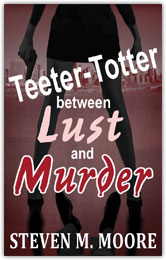 In my mysteries and thrillers, Detective Castilblanco’s quips and Esther Brookstone’s penchant for collecting husbands often add humor—he’s a Latino, after all; and she’s an atypical Englishwoman, quite unlike Christie’s prim and proper Miss Marple. Perhaps my Esther deserves to be called that American term, cougar. I play Esther against type like I do Dao-Ming Chen, Castilblanco’s longtime partner, especially in Teeter-Totter between Lust and Murder. I love to do that! It makes characters more interesting. And atypical characters often can add humor even though humor isn’t the goal.
In my mysteries and thrillers, Detective Castilblanco’s quips and Esther Brookstone’s penchant for collecting husbands often add humor—he’s a Latino, after all; and she’s an atypical Englishwoman, quite unlike Christie’s prim and proper Miss Marple. Perhaps my Esther deserves to be called that American term, cougar. I play Esther against type like I do Dao-Ming Chen, Castilblanco’s longtime partner, especially in Teeter-Totter between Lust and Murder. I love to do that! It makes characters more interesting. And atypical characters often can add humor even though humor isn’t the goal.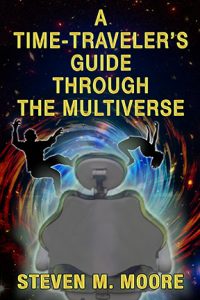 Comments are always welcome. (Please follow the rules on the “Join the Conversation” web page.)
Comments are always welcome. (Please follow the rules on the “Join the Conversation” web page.)
